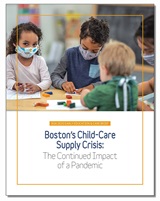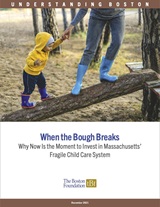This month’s Early Childhood Coffee & Conversation convened for a look at data collection past and present. Boston Opportunity Agenda researchers Fernanda Campbell and Pratima Patil contextualized how data collected in the few years before the pandemic revealed an early child-care and education system already in dire straits when COVID-19 pushed it into a full crisis state, as well as what data are still needed to make smart changes to the system to keep us from bouncing from crisis to crisis.
Campbell told how a consortium began seeking data around 2017 to understand the capacity, quality and workforce characteristics of the region’s child-care sector, and found sharp declines in the number of available “seats,” or places for youngsters in care, especially for infants. Losses were greatest among family-centered care settings. Analysis shows the key driver of the current child-care crisis is the limited early ed workforce, with notable differences by neighborhood. Workforce changes will be at the center of the recovery in the post-COVID era, Campbell said, but as was noted in the last When the Bough Breaks gathering, the workforce crisis is really a wage crisis.
Fixing the system in terms of access, affordability and quality—and making it sustainable for those who choose child-care work as a career—will require deeper insights into its sticking points. Which inputs to the system are creating inequitable outputs? Patil explained a brand-new data collection effort which will both gather information from and provide information to practitioners. A just-issued survey, translated into the seven most commonly spoken languages in the area, asks a number of questions, from workers’ current pay and benefits vs. their desired pay and benefits to years in the field to employment sector of client parents and more. The survey was emailed with further steps planned as part of the effort to make sure that respondents represent a very broad sweep of the sector, encompassing the varying access and technological skills present in the field. To overcome “survey fatigue” and reach as many people as possible, such efforts will include personal outreach and follow-up contacts. Researchers will be patient, taking time to collect, understand and “democratize” the data so it becomes useful for many, and in the end support and speed along the needed changes to the system.



